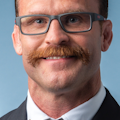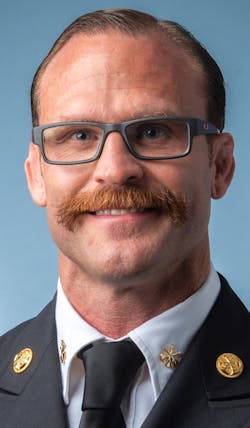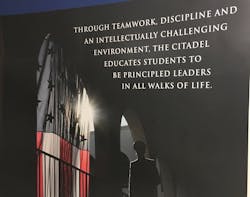When I was a 17-year-old knob at The Citadel, I was introduced to a concept that would begin my journey of leadership and that would guide me through my life. At the time, that concept didn’t make sense to me nor did I understand how much of an effect that it would have on me. All I remember is that I was absolutely petrified of my company commander the first time that I saw him. I can remember him like it was yesterday. This dude was the epitome of what The Citadel taught. The way that he wore his uniform was pristine, pressed and altered to fit him perfectly. His haircut was on point, and he was built like a statue. He articulated well and didn’t mess around when it came to leading the company. All that I knew is that I wanted to emulate him, whatever it took. It’s funny though: I wanted to emulate him, but he absolutely didn’t like me. You see, I had a problem with learning how to perform basic marching and rifle movements. So, every time that I messed up, he was right there, and, boy, would he give me an earful. It got to the point where he would yell, “Griffin, stop shaking!” That’s how nervous that this guy made me. However, it wasn’t that he made me nervous in a bad way. It was more that he took his responsibility so seriously and that he set the example so high, it was difficult to live up to.
Lo and behold, he was a very nice guy, and he built a huge following with his demeanor and his leadership skills. Well, little did I know that he had bought into the concept of what The Citadel is built on: principled leadership. Now, back then, it wasn’t as documented or as published as it is in today’s internet society, but the guiding principles were the same. This concept has been evolving since 1842, when The Citadel was established, and it will continue to do so long after we’re gone.What is principled leadership, and how can this help you in your journey personally and professionally? Ingenious of them, The Citadel utilizes the acronym LEADERS to express each part of the concept of principled leadership. It’s easy to remember and recall when you need it:
L—Lead with humility;
E—Embrace a true, authentic self;
A—Act and speak with courage;
D—Develop and value people and resources;
E—Empower and hold others accountable;
R—Respect others by building trust and learning from mistakes; and
S—Serve others before self.
Lead with humility speaks to viewing one’s own strengths and weaknesses in a balanced perspective that recognizes the abilities of others and invites their contributions.
Embracing a true, authentic self refers to staying open and truthful with others by acting consistently. It also incorporates demonstrating authenticity by accurately representing one’s true intention and commitments as well as not behaving inconsistently according to a role or position.
Acting and speaking with courage means engaging challenging situations proactively by strongly relying on values and convictions. It also calls for taking risks that are reasonable in view of potential benefits, particularly for innovation and creativity.
Developing and valuing people and resources speaks to taking responsibility for the value of people and resources and stewarding them in the common interest, rather than using them in one’s self-interest.
Empowering and holding others accountable enables and encourages the personal development of others, believing in the inherent value of each individual, and giving authority and power to make decisions. Also, holding others accountable for performance and outcomes within their control ensures that they know what’s expected.
Respecting others by building trust and learning from mistakes creates an environment of trust and freedom in which others can make and learn from mistakes. This tenet also refers to accepting and understanding others, to build trust and healthy interpersonal relationships and to bring out the best efforts of others. One also must make reasonable efforts to avoid rejecting or punishing others as well as not trying to get even.
Serve others before self demonstrates inclusive leadership that embraces diversity and creates security, opportunity and fulfillment for all.
This is powerful information that is followed and utilized easily with practice.
Now, please don’t think that this is an article that’s designed to talk about myself, because I went to The Citadel or to impress you. I don’t care about that one bit. There’s no ulterior motive here. I write from my reality.
That said, I view the concepts that I was taught in becoming a part of “The Long Gray Line” and on “the road less traveled” as unique. I wanted to share a small part of that experience in the hope that it sparks a fire inside of you.
Finally, the information that you just read isn’t from some random concept that I believe is cool to write about, with no experience in it whatsoever. It’s how I live my life every day. I hope that it is helpful to you, because the more that I seem to learn and to pass on to others, the more I realize, I don’t know much at all.
About the Author

Dr. David Griffin
Dr. David Griffin is the assistant chief of administration in Charleston, SC. He was the operator of the first-due engine on June 18, 2007, when nine of his fellow firefighters perished. Griffin has come through the ranks in operations in every uniformed position, from firefighter to battalion chief and shift commander to his current position, during his 20-year career in Charleston. He has a bachelor's degree in education from The Citadel, a master's degree in executive fire service leadership, and a doctorate of education in organizational leadership and development. Griffin is the author of "In Honor of The Charleston 9: A Study of Change Following Tragedy," among three other books. He is an international speaker and instructor, a certified Chief Fire Officer and Chief Training Officer with The Center for Public Safety Excellence, an IFSAC/Pro Board-certified Fire Officer IV and a graduate of the Executive Fire Officer Program from the National Fire Academy. He is a graduate of Harvard University's Kennedy School of Executive Education program: Senior Executives in State and Local Government and of the Psychology of Leadership program at Cornell University's SC Johnson College of Business. Griffin is the owner of On A Mission, LLC, at drdavidgriffin.com.

